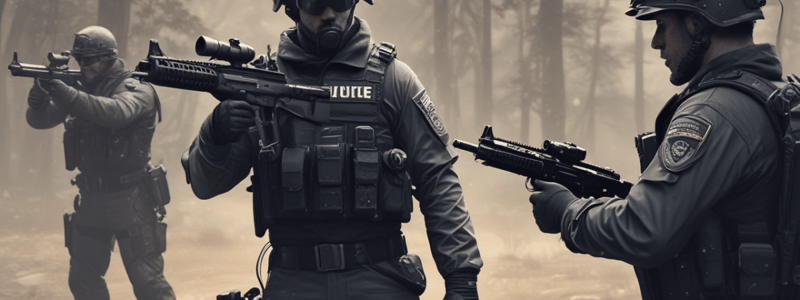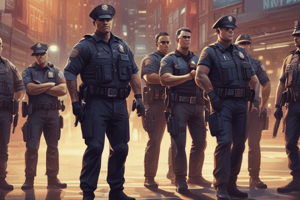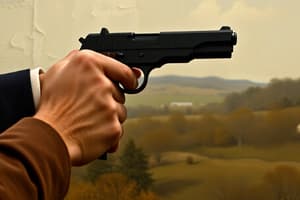Podcast
Questions and Answers
What is the primary goal of a peace officer according to the text?
What is the primary goal of a peace officer according to the text?
- To panic when shot
- To train and mentally condition oneself to keep fighting (correct)
- To avoid getting wounded
- To retreat from a deadly force situation
What is the recommended response when shot?
What is the recommended response when shot?
- Do not panic and focus on preventing further harm (correct)
- Try to take revenge on the attacker
- Surrender to the attacker
- Panic and retreat
What is the significance of being alive after being shot?
What is the significance of being alive after being shot?
- It's a sign that you should give up
- It's a good sign that you can still fight (correct)
- It's a bad omen
- It's a sign of weakness
What should be your immediate goal if you've been hit?
What should be your immediate goal if you've been hit?
What can keep a person going even when wounded?
What can keep a person going even when wounded?
What is a commonality among Medal of Honor citations?
What is a commonality among Medal of Honor citations?
What is the primary emotional response of most people upon seeing sudden, violent death?
What is the primary emotional response of most people upon seeing sudden, violent death?
What is the term for the feeling of joy and elation experienced by some individuals after taking a life?
What is the term for the feeling of joy and elation experienced by some individuals after taking a life?
What is the outcome for some officers who do not feel remorse or nausea after killing?
What is the outcome for some officers who do not feel remorse or nausea after killing?
What is the result of not preparing oneself for the possibility of killing in a deadly force situation?
What is the result of not preparing oneself for the possibility of killing in a deadly force situation?
What is the primary goal when you are wounded in a combat situation?
What is the primary goal when you are wounded in a combat situation?
What is the final stage of the response to taking a life, according to the text?
What is the final stage of the response to taking a life, according to the text?
What is the estimated time frame during which a person can still take action after their heart has stopped due to a bullet?
What is the estimated time frame during which a person can still take action after their heart has stopped due to a bullet?
What is the reason some officers may feel guilty after killing in a deadly force situation?
What is the reason some officers may feel guilty after killing in a deadly force situation?
What is the key factor in surviving a deadly force situation, according to the text?
What is the key factor in surviving a deadly force situation, according to the text?
What can be the result of preparing oneself for the possibility of killing in a deadly force situation?
What can be the result of preparing oneself for the possibility of killing in a deadly force situation?
Why is it important for an officer to accept the possibility of having to kill someone in a deadly force situation?
Why is it important for an officer to accept the possibility of having to kill someone in a deadly force situation?
What is the outcome for some officers who kill in a deadly force situation without feeling remorse or nausea?
What is the outcome for some officers who kill in a deadly force situation without feeling remorse or nausea?
What is the primary goal of an officer in a deadly force situation?
What is the primary goal of an officer in a deadly force situation?
What is the initial response of some individuals who kill in a deadly force situation?
What is the initial response of some individuals who kill in a deadly force situation?
What is the outcome if an officer hesitates to use deadly force when necessary?
What is the outcome if an officer hesitates to use deadly force when necessary?
What can be the consequence of denying the possibility of having to kill in a deadly force situation?
What can be the consequence of denying the possibility of having to kill in a deadly force situation?
What determines the amount of force an officer has to use in a deadly force situation?
What determines the amount of force an officer has to use in a deadly force situation?
What is the result if an officer is truly prepared to kill someone in a deadly force situation?
What is the result if an officer is truly prepared to kill someone in a deadly force situation?
Why is it important for an officer to decide whether they can kill another human being in advance?
Why is it important for an officer to decide whether they can kill another human being in advance?
What is the purpose of accepting the possibility of having to kill someone in advance?
What is the purpose of accepting the possibility of having to kill someone in advance?
What is the most valuable thing in the world according to the passage?
What is the most valuable thing in the world according to the passage?
What is the typical response of a person who has experienced a traumatic event, according to the passage?
What is the typical response of a person who has experienced a traumatic event, according to the passage?
What is the common feeling that returning veterans of combat may experience, according to the passage?
What is the common feeling that returning veterans of combat may experience, according to the passage?
What is the purpose of the response stages to death, as described by Dr. Elizabeth Kubler-Ross, according to the passage?
What is the purpose of the response stages to death, as described by Dr. Elizabeth Kubler-Ross, according to the passage?
What is the primary reason why a person's loved ones may be angry with them after a traumatic event, according to the passage?
What is the primary reason why a person's loved ones may be angry with them after a traumatic event, according to the passage?
What is the recommended response to a loved one's anger after a traumatic event, according to the passage?
What is the recommended response to a loved one's anger after a traumatic event, according to the passage?
What is the purpose of tactical breathing, as described in the passage?
What is the purpose of tactical breathing, as described in the passage?
What is the common physical response to a stressful event, as described in the passage?
What is the common physical response to a stressful event, as described in the passage?
What is the recommended approach to dealing with post-combat responses, as described in the passage?
What is the recommended approach to dealing with post-combat responses, as described in the passage?
What is the primary emotional response to surviving a traumatic event, as described in the passage?
What is the primary emotional response to surviving a traumatic event, as described in the passage?
What is the effect of tactical breathing on the autonomic nervous system?
What is the effect of tactical breathing on the autonomic nervous system?
What is the primary purpose of tactical breathing in a stressful situation?
What is the primary purpose of tactical breathing in a stressful situation?
What is the relationship between the somatic nervous system and the autonomic nervous system?
What is the relationship between the somatic nervous system and the autonomic nervous system?
What is the technical term for tactical breathing?
What is the technical term for tactical breathing?
What is the primary purpose of a critical incident debriefing?
What is the primary purpose of a critical incident debriefing?
What should be communicated to individuals during a critical incident debriefing?
What should be communicated to individuals during a critical incident debriefing?
Who should conduct a critical incident debriefing?
Who should conduct a critical incident debriefing?
When should a critical incident debriefing ideally take place?
When should a critical incident debriefing ideally take place?
What is the recommended approach to getting individuals to participate in a critical incident debriefing?
What is the recommended approach to getting individuals to participate in a critical incident debriefing?
What is the effect of tactical breathing on the memory of a critical incident?
What is the effect of tactical breathing on the memory of a critical incident?
What is the purpose of the breathing exercise in a debriefing session?
What is the purpose of the breathing exercise in a debriefing session?
Why is it important for peace officers to participate in debriefing sessions?
Why is it important for peace officers to participate in debriefing sessions?
What is a key objective of a debriefing session?
What is a key objective of a debriefing session?
What should you avoid doing when approaching someone who has been involved in a traumatic incident?
What should you avoid doing when approaching someone who has been involved in a traumatic incident?
What should you do when listening to someone who has been involved in a traumatic incident?
What should you do when listening to someone who has been involved in a traumatic incident?
What should you avoid referring to someone who has psychological problems as?
What should you avoid referring to someone who has psychological problems as?
Why should you educate yourself about trauma reactions?
Why should you educate yourself about trauma reactions?
What should you not do when interacting with someone who has been involved in a traumatic incident?
What should you not do when interacting with someone who has been involved in a traumatic incident?
What is the recommended approach when interacting with someone who has been involved in a traumatic incident?
What is the recommended approach when interacting with someone who has been involved in a traumatic incident?
What should you say if you're unsure of what to do or say when interacting with someone who has been involved in a traumatic incident?
What should you say if you're unsure of what to do or say when interacting with someone who has been involved in a traumatic incident?
Flashcards are hidden until you start studying
Study Notes
Understanding Deadly Force Situations
- A peace officer's primary goal is to survive and stop the threat, even when wounded
- Accepting the possibility of getting injured can help you mentally prepare for deadly force situations
- The will to survive is crucial in such situations; it can be the difference between life and death
The Importance of Breathing and Control
- Breathing is the bridge between the somatic and autonomic nervous systems
- Tactical breathing (four-count method) can help control the sympathetic nervous system response (fear and anger)
- This technique can be used before, during, and after a deadly force situation to calm and prepare oneself
Debriefing after Critical Incidents
- Critical incident debriefings are essential to help warriors process their experiences
- The debriefing should be conducted by someone the individual trusts and respects
- The objective is to delink the memory from physiological arousal and provide support from superiors and peers
Supporting Survivors of Traumatic Incidents
-
Approach survivors with respect, compassion, and empathy
-
Initiate contact, offer support, and let them decide how much contact they want
-
Avoid asking for an account of the incident, but be available to listen
-
Apply nonjudgmental listening and offer help when needed
-
Avoid encouraging the use of alcohol and promote healthy coping mechanisms### Supporting a Trauma Survivor
-
Avoid giving coffee to someone immediately after a traumatic incident, as it can further stimulate their already heightened system.
Communication Etiquette
- Refrain from using derogatory labels or jokes that downplay the severity of the incident.
- Avoid making comments that second-guess the survivor's actions.
- Keep negative opinions to yourself and instead focus on encouraging self-care.
Confrontation and Education
- Gently address any persistent negative behavioral or emotional changes (lasting over a month) with the survivor.
- Educate yourself about trauma reactions through reading or consulting with an expert to better understand the survivor's experience.
Building Trust
- Treat the survivor as you normally would, without drastic changes in behavior or attitude.
- Avoid pretending the incident didn't happen or treating the survivor as fragile.
- When unsure of what to say, express relief that they're okay: "I'm just glad you are okay."
Studying That Suits You
Use AI to generate personalized quizzes and flashcards to suit your learning preferences.




